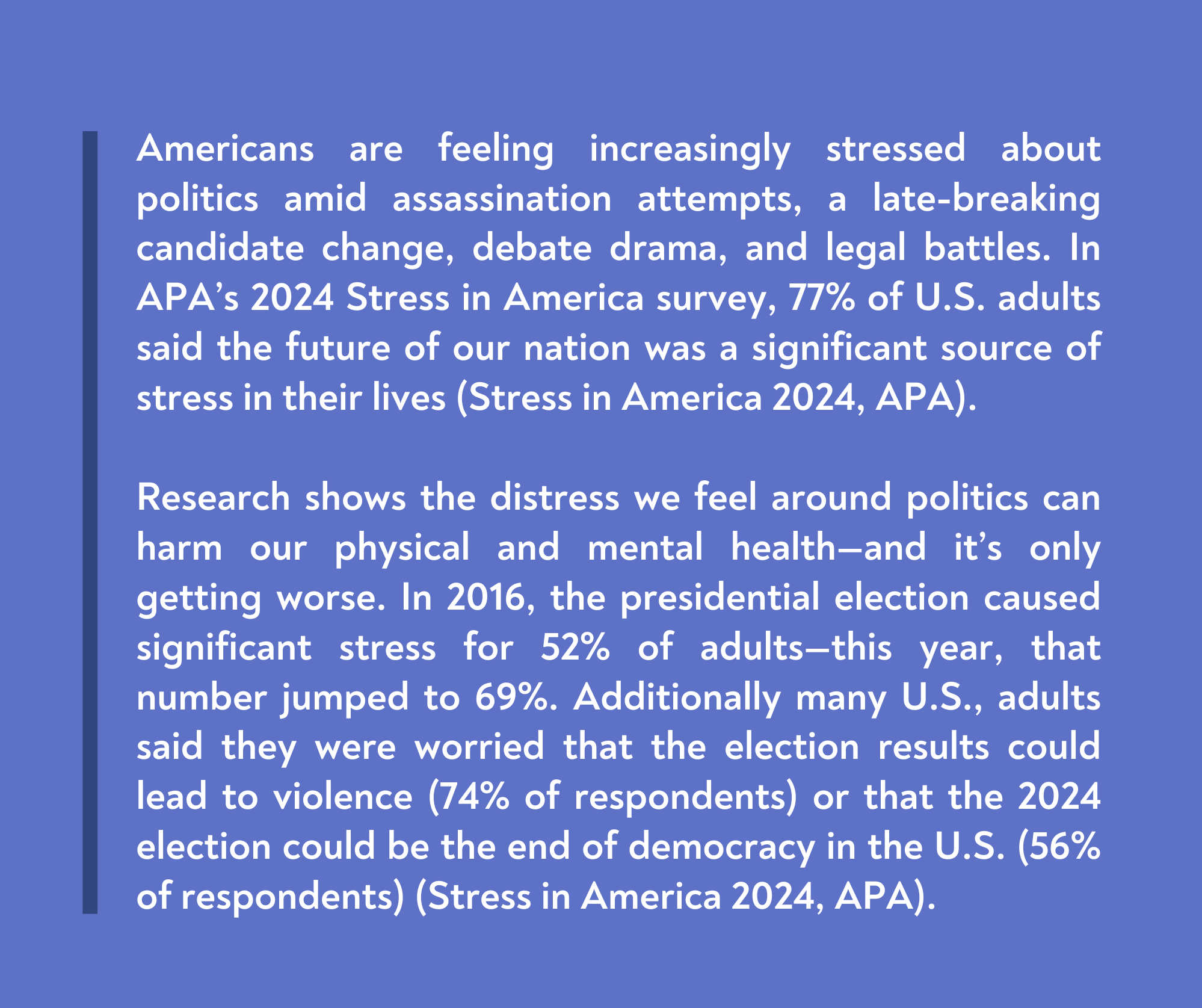Managing Election Anxiety: Staying Grounded During Uncertain Times
Election seasons often bring intense emotions as we face the uncertainty of the results and what they could mean for our lives, communities, and country. If you’re feeling on edge, know that you’re not alone—many people experience heightened anxiety during elections, and there are strategies that can help you feel more grounded and in control.
At Healgood, we’ve been supporting clients (and ourselves!) through election anxiety by using evidence-based approaches that include techniques from Dialectical Behavior Therapy (DBT), Cognitive Behavioral Therapy (CBT), neuropsychology, and relational strategies. Here’s how these approaches can help you stay grounded.
1. Understanding Election Anxiety
Election anxiety is a response to uncertainty and high stakes, as elections can affect various aspects of our lives, including social values, healthcare, and education. It is common for the brain to react to uncertainty with heightened anxiety, as it perceives unpredictability as a potential threat. Recognizing election anxiety as a valid response to uncertainty can help reduce self-criticism and encourage a more compassionate approach to managing stress.
2. Using DBT Skills to Stay Balanced
Dialectical Behavior Therapy (DBT) offers valuable tools for managing intense emotions and staying grounded in times of stress. Here are some DBT strategies to consider:
Mindfulness: Election anxiety often arises from feeling out of control over outcomes. Mindfulness, a core component of DBT, can help you stay grounded in the present, accepting what you cannot change while finding peace in the here and now. Practicing mindfulness can help you stay present and focus on what you can control. For example, if you find yourself overwhelmed by election news, take a mindful break. Engage in a simple grounding exercise like observing your breathing or noticing the sensations of your surroundings.
TIPP your nervous system: The DBT skill called TIPP (Temperature, Intense Exercise, Paced Breathing, Paired Muscle Relaxation) can be especially helpful in moments of heightened anxiety. Try a quick burst of exercise or cold water on your face to reset your nervous system.
Self-Soothing Techniques: Comfort yourself with calming activities that engage your senses, such as listening to soothing music, drinking a warm cup of tea, or spending time in nature. These practices can help you reconnect with a sense of peace and safety.
Radical Acceptance: Accepting that you cannot control the outcome of the election can help alleviate the anxiety that stems from wanting to control the uncontrollable. Radical acceptance does not mean approval; it simply acknowledges the reality of the situation to reduce inner resistance and distress. Remind yourself that while election outcomes may feel uncertain, you can control your response. Use phrases like “I accept that I feel anxious, and I can handle this moment,” to acknowledge feelings without judgment.
3. Using CBT Techniques to Challenge Anxious Thoughts
Cognitive Behavior Therapy (CBT) can help you recognize and reframe anxious thoughts, making it easier to break free from unhelpful mental patterns.
Cognitive Restructuring: Identify automatic thoughts that are contributing to your election anxiety, such as catastrophic thinking, “Everything will go wrong if [X] happens,” try to reframe that thought by considering alternative outcomes or focusing on aspects within your control. While election outcomes might feel critical, worrying excessively about worst-case scenarios may lead to unnecessary stress.
Avoid Avoiding: Anxiety often leads to avoidance, but staying engaged with daily routines can help maintain a sense of stability. If election stress is causing you to withdraw from activities you enjoy, schedule time for those activities as a reminder that life continues, even during times of uncertainty.
Limiting Media Consumption: Constant exposure to news and social media can exacerbate election anxiety. Set boundaries around how much time you spend consuming election-related content, and designate certain times of day to check updates rather than scrolling throughout the day.
Use “Anchor Statements” to Ground Yourself: Anchor statements are short, reassuring phrases that help remind you of stability and perspective during anxious moments. If you’re feeling overwhelmed, try phrases like, “I am grounded and resilient,” or “I am doing the best I can with what I have.” Repeat these statements to yourself as a way of calming your mind and focusing on what is within your control. Over time, this practice can strengthen your ability to stay centered, even during turbulent times.
Focus on Small, Positive Actions: Instead of letting anxiety spiral, focus on meaningful, small actions that align with your values, whether it's volunteering, helping someone in your community, or practicing self-care.
4. Neuropsychological Approaches: Understanding the Brain’s Reaction to Stress
From a neuropsychological perspective, election anxiety triggers the brain’s “fight, flight, freeze, or fawn” response, as it interprets uncertainty as a potential threat. Here are a few brain-based techniques to help manage this response:
Grounding Exercises: Grounding helps calm the amygdala, the brain’s fear center, by bringing your attention to the present. Simple techniques like counting backward from 100, engaging in a tactile activity (like squeezing a stress ball), or focusing on five things you can see around you can help ease anxiety.
Engaging the Prefrontal Cortex: Activities that require focus and problem-solving, such as puzzles, drawing, or reading, help activate the prefrontal cortex, the brain’s rational decision-making center. This can make it easier to process and manage emotions.
Prioritizing Rest: Quality sleep has a significant impact on brain function and mood regulation. Aim for adequate rest and incorporate intentional sleep hygiene.
Activate the Relaxation Response: Engage in activities that calm the nervous system, such as deep breathing, gentle movement, or progressive muscle relaxation. These actions send signals to your brain that you’re safe, reducing the intensity of stress hormones.
Limit Exposure to Triggers: The constant flow of news and social media can keep your brain in a state of hyper-arousal. Set boundaries by limiting screen time, choosing specific times to check updates, and making time for activities that soothe and rejuvenate you.
5. Relational Strategies for Support and Connection
Election anxiety can also impact our relationships. Discussions about political views may increase tension, especially if family or friends hold differing opinions. Here’s how to navigate relationships while managing election stress:
Express Your Needs: If conversations about the election or political topics feel overwhelming or are causing distress, know that it’s okay to set boundaries with others. You can kindly let others know that you prefer to keep the focus on other topics for the time being or that you need a break from political discussions to focus on maintaining a healthy connection.
Seek Social Support: Connect with friends, family, or a therapist who can provide a safe space to discuss your thoughts and feelings. Sharing concerns can reduce the sense of isolation that often accompanies election anxiety.
Practice Empathic Listening: If political discussions arise, approach them with empathy and curiosity. Remember that different perspectives often stem from unique life experiences. Empathic listening doesn't mean agreeing with them, but acknowledging their perspective can help reduce relational tension and foster understanding.
Be Kind to Yourself: Don’t forget about the relationship with yourself and practice self-compassion. Election anxiety is a normal response to a significant and uncertain event, and it’s okay to feel unsettled. Try not to be hard on yourself if you’re feeling more anxious or reactive than usual. Be gentle and forgiving with yourself, acknowledging that you’re navigating a difficult experience.
6. Election Day and Beyond
Election anxiety doesn’t always end on Election Day; uncertainty around results can extend stress. Here’s how to stay grounded:
Create a Self-Care Plan: Plan soothing activities for Election Day and the days following it. Whether it’s taking a nature walk, reading, or spending time with loved ones, having activities that help you relax can provide a sense of structure and comfort.
Focus on Small Actions: Rather than fixating on the big picture, find small, meaningful ways to contribute to your community, such as volunteering, donating, or engaging in positive discussions. These actions can create a sense of agency and purpose.
Support at Healgood
If you’re experiencing election anxiety, Healgood is here to help. We offer evidence-based therapies like DBT and CBT, providing tools to manage stress and build resilience. Election season can feel overwhelming, but with support, self-compassion, and a focus on the present, it’s possible to stay centered. Take it one day at a time, and if you need additional support, reach out to learn more about our anxiety-focused services.
References
Abrams, Zara. American Psychological Association, “The Impact of Election Stress: Is Political Anxiety Harming Your Health?” 22 Oct. 2024, https://www.apa.org/monitor/2024/10/managing-political-stress.
American Psychological Association (2024). Stress in America™ 2024: A Nation in Political Turmoil. Retrieved from: https://www.apa.org/pubs/reports/stress-in-america/2024/2024-stress-in-america-full-report.pdf
Beck, A. T., & Haigh, E. A. P. (2014). Advances in cognitive theory and therapy: The generic cognitive model. Annual Review of Clinical Psychology, 10, 1-24.
Beck, J. S. (2011). Cognitive Behavior Therapy: Basics and Beyond. Guilford Press.
Davidson, R. J., & McEwen, B. S. (2012). Social influences on neuroplasticity: Stress and interventions to promote well-being. Nature Neuroscience, 15(5), 689-695.
Linehan, M. M. (2015). DBT Skills Training Manual. Guilford Publications.
Sapolsky, R. M. (2004). Why Zebras Don’t Get Ulcers: A Guide to Stress, Stress-related Diseases, and Coping. Henry Holt and Company.
Siegel, D. J. (2010). The Mindful Therapist: A Clinician’s Guide to Mindsight and Neural Integration. W. W. Norton & Company.




